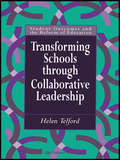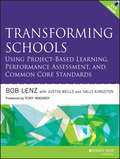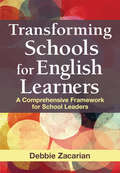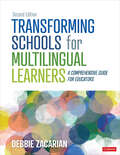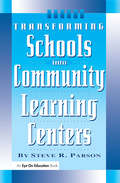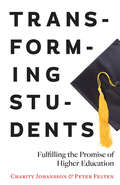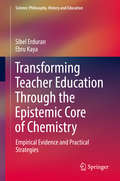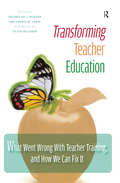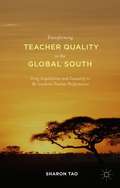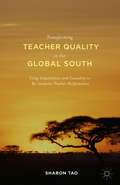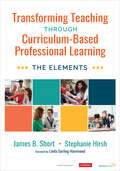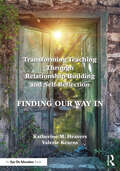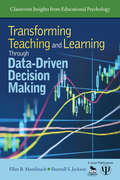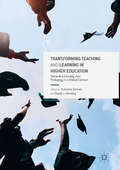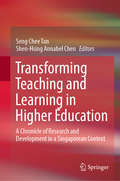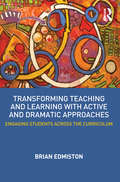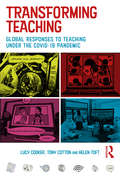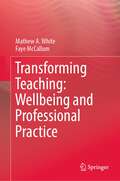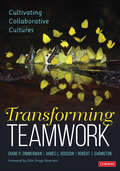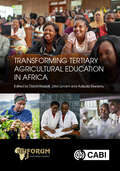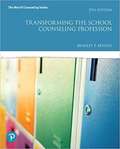- Table View
- List View
Transforming Schools
by Helen TelfordFirst published in 1996. Routledge is an imprint of Taylor & Francis, an informa company.
Transforming Schools Using Project-Based Learning, Performance Assessment, and Common Core Standards
by Bob Lenz Justin Wells Sally KingstonIt's not what students know, but what they do with what they know that is important Schools are changing in response to this reality, and in Transforming Schools Using Project-Based Learning, Performance Assessment, and Common Core Standards, Bob Lenz, Justin Wells, and Sally Kingston draw on the example of the Envision Education schools, as well as other leading schools around the country, to show how the concept of deeper learning can meet the need for students who are both college and career ready and engaged in their own education. In this book, the authors explain how project-based learning can blend with Common Core-aligned performance assessment for deeper learning. You'll discover how many schools have successfully made the transition from traditional, teacher-centered learning to project-based, deeper learning and find many practical ideas for implementation. Companion DVD and website include videos showing how to implement deeper learning strategies in the classroom Evidence-based descriptions show why deeper learning is right for students Performance assessment experts explain how to align assessments with Common Core by shifting the emphasis from knowing to doing Extensive game plan section provides step-by-step guidance for change Schools are complex organizations, and transformation involves all of the stakeholders, from students to superintendents. But as this book shows, there are amazing benefits to be realized when everyone commits to diving deeper into learning.
Transforming Schools for English Learners: A Comprehensive Framework for School Leaders
by Debbie ZacarianPosition your school to successfully teach English learners Could your school be more effective at instructing its English learners? Whether you are just beginning to work with an emergent population or need to improve your program, this book provides a comprehensive framework for improving ELs’ academic performance and school engagement through visionary planning of EL education programming. The author addresses such critical topics as: Selecting the appropriate program model for your school Creating effective student course schedules for language development and content Making data-driven decisions using effective measures of student performance learning Effectively using Response to Intervention (RTI)
Transforming Schools for Multilingual Learners: A Comprehensive Guide for Educators
by Debbie ZacarianEssential principles, practices, and structures for multilingual learners Much has changed in the ten years since this book was first published. A celebrated triumph, it provided state, district, school, and teacher leaders with a comprehensive guide to support multilingual learners to reach their full potential. From selecting the appropriate program model to partnering with families and infusing federal and state laws governing the education of multilingual learners and the rights of their families into all we do, the key messages that made the first edition of this book a renowned success have been re-examined in the second edition with a robust lens to meet these demanding times. This second edition supports educators to design and enact policies, practices, and structures for multilingual learners (MLs) to feel a sense of safety, belonging, value, and competence. Topics explored in the book include: a discussion of the changes to federal and state policies and their impact on MLs and their families strategies to move from a deficit- to an asset-based approach that values multilingualism nine principles to design and deliver high-quality lessons in multiple languages and across disciplines practices to identify and support MLs with learning differences and disabilitiessteps for building long-lasting family-school partnerships Reflecting changing trends in leadership, this new edition supports superintendents, principals, curriculum supervisors, coaches, mentors, teachers, and other stakeholders in their collaborative efforts to create and sustain successful language assistance programs.
Transforming Schools for Multilingual Learners: A Comprehensive Guide for Educators
by Debbie ZacarianEssential principles, practices, and structures for multilingual learners Much has changed in the ten years since this book was first published. A celebrated triumph, it provided state, district, school, and teacher leaders with a comprehensive guide to support multilingual learners to reach their full potential. From selecting the appropriate program model to partnering with families and infusing federal and state laws governing the education of multilingual learners and the rights of their families into all we do, the key messages that made the first edition of this book a renowned success have been re-examined in the second edition with a robust lens to meet these demanding times. This second edition supports educators to design and enact policies, practices, and structures for multilingual learners (MLs) to feel a sense of safety, belonging, value, and competence. Topics explored in the book include: a discussion of the changes to federal and state policies and their impact on MLs and their families strategies to move from a deficit- to an asset-based approach that values multilingualism nine principles to design and deliver high-quality lessons in multiple languages and across disciplines practices to identify and support MLs with learning differences and disabilitiessteps for building long-lasting family-school partnerships Reflecting changing trends in leadership, this new edition supports superintendents, principals, curriculum supervisors, coaches, mentors, teachers, and other stakeholders in their collaborative efforts to create and sustain successful language assistance programs.
Transforming Schools into Community Learning Centers
by Stephen ParsonThis book shows how schools can provide services to all members of the community, not just to children of school age. It also demonstrates how a school's instructional program and facilities can include community resources.
Transforming Students: Fulfilling the Promise of Higher Education
by Peter Felten Charity JohanssonCollege has the power to transform students into intentional, critical, and engaged people.The recent trend of trying to measure higher education’s return on investment misses a fundamental point, argue Charity Johansson and Peter Felten. The central purpose of a college or university is to transform the lives of students—not to merely change them or help them mature. This transformation is an ongoing process of intentionally aligning one’s behavior with one’s core sense of personal identity. It is the university’s central role to lead students in this transformation, a process that shapes students into intentional, critical, and engaged individuals.Recognizing the remarkable influence of the college experience on peoples’ lives, the authors offer a guide to how colleges and universities can effectively lead students through this life-changing process. Drawn from extensive interviews with students and graduates, faculty and staff, Transforming Students gathers diverse stories to show how students experience the transformation process, which rarely follows a neat or linear path. The interviews illustrate central themes from the literature on transformative learning and the undergraduate student experience.A sequel of sorts to George Keller’s classic Transforming a College—which chronicled Elon University’s metamorphosis from struggling college to a top regional university—Transforming Students addresses the school’s core educational mission: to shape students into engaged adults who embrace learning as a lifelong endeavor. Given this effect, the college experience is much more than preparation for a career. It is preparation for life.
Transforming Study Abroad: A Handbook
by Neriko Musha DoerrWritten for study abroad practitioners, this book introduces theoretical understandings of key study abroad terms including “the global/national,” “culture,” “native speaker,” “immersion,” and “host society.” Building theories on these notions with perspectives from cultural anthropology, political science, educational studies, linguistics, and narrative studies, it suggests ways to incorporate them in study abroad practices. Through attention to daily activities via the concept of immersion, it reframes study abroad not as an encounter with cultural others but as an occasion to analyze constructions of “differences” in daily life, backgrounded by structural arrangements.
Transforming Teacher Education Through the Epistemic Core of Chemistry: Empirical Evidence and Practical Strategies (Science: Philosophy, History and Education)
by Sibel Erduran Ebru KayaThis book synthesizes theoretical perspectives, empirical evidence and practical strategies for improving teacher education in chemistry. Many chemistry lessons involve mindless “cookbook” activities where students and teachers follow recipes, memorise formulae and recall facts without understanding how and why knowledge in chemistry works. Capitalising on traditionally disparate areas of research, the book investigates how to make chemistry education more meaningful for both students and teachers. It provides an example of how theory and practice in chemistry education can be bridged. It reflects on the nature of knowledge in chemistry by referring to theoretical perspectives from philosophy of chemistry. It draws on empirical evidence from research on teacher education, and illustrates concrete strategies and resources that can be used by teacher educators. The book describes the design and implementation of an innovative teacher education project to show the impact of an intervention on pre-service teachers. The book shows how, by making use of visual representations and analogies, the project makes some fairly abstract and complex ideas accessible to pre-service teachers.
Transforming Teacher Education: What Went Wrong with Teacher Training, and How We Can Fix It
by Chance W. Lewis Valerie Hill-JacksonExtracts from the text:"Why are fifteen million children and youth in poverty not achieving when we know that low-income students excel in the classrooms of “star” teachers (who comprise approximately 8 percent of the teaching force)?" "Whose needs or interests are being met in education reform today?" “In my own institution, there has not been a systematic assessment of the effectiveness of the basic teacher education program since the institution was founded over a century ago as a teachers college. Imagine, not one ever!”"Teachers who empathize with students and the life challenges they face soon realize that the dysfunctional bureaucracies will not permit them to meet the needs of their students. Half of the starry-eyed beginners are gone in five years or less." "Why does teacher education focus on the managerial, instrumental or delivery system aspects of the profession?""The expert advice dispensed by schools of education regarding what future teachers should do is not connected to any theory of learning, or to any reality of life in school classrooms." "Why has the recruitment process resulted in a cohort of teachers who are unable to connect with their students?""Does a qualified teacher equate to a quality teacher?""The best hope of getting more effective teachers from university teacher preparation programs is to base their budgets on the number of their graduates who serve in challenging schools and their effectiveness with children and youth. At the district level, the salaries of hiring officials should be based on how well these officials identify and retain quality teachers."In this book, 12 distinguished scholars provide a hard-hitting, thoroughly researched, historical and theoretical critique of our schools of education, and offer clear recommendations on what must be done to ensure all children can achieve their potential, and contribute to a vibrant, democratic society.
Transforming Teacher Quality in the Global South: Using Capabilities and Causality to Re-examine Teacher Performance
by Sharon TaoTransforming Teacher Quality in the Global South.
Transforming Teacher Quality in the Global South: Using Capabilities and Causality to Re-examine Teacher Performance
by Sharon TaoA common story of teachers from the Global South portrays them as deficient, unreliable and unprofessional. However, this book uses an innovative Capability Approach/Critical Realist lens to reveal the causal links between teachers' constrained capabilities and their 'criticised' behaviours and offer nuanced, creative strategies for improvements.
Transforming Teaching Through Curriculum-Based Professional Learning: The Elements
by Jim Short Stephanie HirshThe future of professional learning starts here. Even the most experienced teachers provided with the highest quality instructional materials benefit from additional support to ensure student success. Simply adopting new instructional materials is unlikely to significantly change teacher practice. Ensuring a level of excellence that benefits all students calls for an approach to professional learning that is anchored in the use of high-quality curriculum and grounded in immersive learning experiences for all teachers. Transforming Teaching Through Curriculum-Based Professional Learning offers a framework for practitioners looking to undertake this work. The curriculum-based professional learning detailed here enables teachers to deepen their understanding of the essential components of successful curriculum implementation and work together to provide instruction that has a positive impact on student engagement and learning. Features include Detailed case studies based on actual schools and districts that illustrate the elements of curriculum-based professional learning in action Detailed guidance on the roles and responsibilities of teachers, administrators, and other stakeholders Comparison charts that show the distinctions between curriculum-based professional learning and more traditional forms of professional development Elements icons that help readers navigate each chapter of the book Teachers’ jobs are changing in real time. When they are supported with both high-quality instructional materials and curriculum-based professional learning, they can position our schools to achieve the dual goals of equity and excellence.
Transforming Teaching Through Curriculum-Based Professional Learning: The Elements
by Jim Short Stephanie HirshThe future of professional learning starts here. Even the most experienced teachers provided with the highest quality instructional materials benefit from additional support to ensure student success. Simply adopting new instructional materials is unlikely to significantly change teacher practice. Ensuring a level of excellence that benefits all students calls for an approach to professional learning that is anchored in the use of high-quality curriculum and grounded in immersive learning experiences for all teachers. Transforming Teaching Through Curriculum-Based Professional Learning offers a framework for practitioners looking to undertake this work. The curriculum-based professional learning detailed here enables teachers to deepen their understanding of the essential components of successful curriculum implementation and work together to provide instruction that has a positive impact on student engagement and learning. Features include Detailed case studies based on actual schools and districts that illustrate the elements of curriculum-based professional learning in action Detailed guidance on the roles and responsibilities of teachers, administrators, and other stakeholders Comparison charts that show the distinctions between curriculum-based professional learning and more traditional forms of professional development Elements icons that help readers navigate each chapter of the book Teachers’ jobs are changing in real time. When they are supported with both high-quality instructional materials and curriculum-based professional learning, they can position our schools to achieve the dual goals of equity and excellence.
Transforming Teaching Through Relationship-Building and Self-Reflection: Finding Our Way In
by Katherine M. Heavers Valerie KearnsCreating connections with and among students is at the heart of all good teaching. In order to do this, we must identify and address the obstacles, conscious and unconscious, getting in the way of this goal. Authors Katherine M. Heavers and Valerie Kearns show how to build authentic relationships that focus on trust and voice while honoring the differences in individuals’ experiences and learning styles.This book covers topics such as fostering trust, wielding language with intention, nurturing emotional safety, offering meaningful feedback, unearthing and confronting bias, and promoting student voice. The authors encourage educators to do their own inner work to embrace vulnerability, which can help them to grow personally and, as a result, better nurture student growth. As a byproduct of this deep reflection, the authors intend for you to enjoy heightened psychological flexibility and experience more joy, both of which will enable you to better serve your students. Each chapter concludes with reflection questions and activities to support, challenge, and extend thinking.Whether reading the book on your own or with colleagues, you will come away feeling supported on your journey as you strive to create meaningful connections that lead to lasting learning and empowered communities.
Transforming Teaching and Learning Through Data-Driven Decision Making
by Ellen B. Mandinach Sharnell S. JacksonConnect data and instruction to improve practice Gathering data and using it to inform instruction is a requirement for many schools, yet educators are not necessarily formally trained in how to do it. This book helps bridge the gap between classroom practice and the principles of educational psychology. Teachers will find cutting-edge advances in research and theory on human learning and teaching in an easily understood and transferable format. The text’s integrated model shows teachers, school leaders, and district administrators how to establish a data culture and transform quantitative and qualitative data into actionable knowledge based on: Assessment Statistics Instructional and differentiated psychology Classroom management
Transforming Teaching and Learning in Higher Education
by Ruksana Osman David J HornsbyUniversities face the prospect of becoming redundant unless the way teaching and learning takes place changes. This book explores the idea of transformation and pedagogy, In particular, it will highlight how universities are transformed through a set of pedagogical interventions and stances that integrate a sense of moral and ethical purpose to learning. Actively integrating cultural pluralism in developing knowledge and understanding aspires to liberate the learner from existing power structures by fostering a desire to challenge and change the social system in which we live and connects the reality around us and its many problems to the knowledge generation process.
Transforming Teaching and Learning in Higher Education: A Chronicle of Research and Development in a Singaporean Context
by Seng Chee Tan Shen-Hsing Annabel ChenThis book chronicles the journeys of educational researchers and academics who have engaged in research and development to improve teaching and learning at universities. It highlights the research evidence, approaches, and in many cases, the journey of transformation rather than prescribing certain principles of and approaches to effective instruction. In other words, it not only describes the destination, but also various pathways leading toward it. Further, it focuses on mechanisms for improving the approaches discussed, rather than simply determining whether one works better than the other. As such, novice and seasoned academics and teaching staff in higher education will benefit from this book, not just from the teaching and learning approaches it highlights, but also from the insights into the respective journeys. The research and development methods and approaches discussed here will also appeal to researchers working in teaching and learning in higher education.
Transforming Teaching and Learning with Active and Dramatic Approaches: Engaging Students Across the Curriculum
by Brian EdmistonA CHOICE Outstanding Academic Title 2014! How can teachers transform classroom teaching and learning by making pedagogy more socially and culturally responsive, more relevant to students’ lives, and more collaborative? How can they engage disaffected students in learning and at the same time promote deep understanding though high-quality teaching that goes beyond test preparation? This text for prospective and practicing teachers introduces engaging, innovative pedagogy for putting active and dramatic approaches to learning and teaching into action. Written in an accessible, conversational, and refreshingly honest style by a teacher and professor with over 30 years' experience, it features real examples of preschool, elementary, middle, and high school teachers working in actual classrooms in diverse settings. Their tales explore not only how, but also why, they have changed the way they teach. Photographs and stories of their classroom practice, along with summarizing charts of principles and strategies, both illuminate the critical, cross-curricular, and inquiry-based conceptual framework Edmiston develops and provide rich examples and straightforward guidelines that can support readers as they experiment with using active and dramatic approaches to dialogue, inquiry, building community, planning for exploration, and authentic assessment in their own classrooms.
Transforming Teaching: Global Responses to Teaching Under the Covid-19 Pandemic
by Tony Cotton Lucy Cooker Helen ToftTransforming Teaching shares the successes and the problems that were solved by a diverse group of educators during the global pandemic. The shared stories from around the globe will help and inspire any teacher to develop skills to support blended learning in whatever teaching situation they find themselves. Including lessons to be learned from Kindergarten to University, this book introduces new ways of working and pedagogical approaches appropriate for developing global skills. It importantly focuses on teacher narratives to aid personal reflection and encourages readers to take responsibility for their own professional development. Each chapter prompts teachers to reflect and build on new skills developed through distance and blended learning, use of technology and new ways of relating to students. Responding to an educational need at a time of crisis, this book is essential reading to all who are interested in the future potential of education and those who want to shape future emerging practice.
Transforming Teaching: Wellbeing and Professional Practice
by Mathew A. White Faye McCallum<p>This book focuses on evidence-based approaches to teaching from a wellbeing lens. It addresses significant issues in wellbeing education in initial teacher education, teacher, and leaders’ wellbeing during, schooling disruption and in teaching more broadly through innovative multi-disciplinary research.<p> <p>This book addresses how to lead wellbeing within schools, and showcases a unique strategy adopted by an Australian university to integrate a wellbeing framework throughout initial teacher education preparation.<p> <p>It explores different evidence-based models of wellbeing education and focuses on the significance of culture and context. Readers can learn how teachers can integrate evidence-based wellbeing approaches to transform their professional practice and promote student flourishing and academic growth.<p>
Transforming Teamwork: Cultivating Collaborative Cultures
by Jim Roussin Diane P. Zimmerman Robert John GarmstonDiscover how psychological safety, constructive conflict, and actionable learning create a powerful triple helix to transform teams! In this ground-breaking resource, three experts in the field of education and teamwork each present one of three strands that, when woven together, support teamwork and forge collaborative interactions into a transformative way of working. You’ll learn approaches, processes and tools to overcome common obstacles to team effectiveness such as feelings of futility, anxiety, and poor morale. Drawing on research and practical experience the authors identify strategies and tools that show how to: Build psychological safety, where teams work towards resilient interpersonal relationships Use constructive conflict as a powerful catalyst for team learning and transformation Inquire into problems of practice to transform capabilities and produce actionable learning Acquire ways to develop mindful, thoughtful, and constructive teams where authentic communication drives group awareness and clear processes and goals. Acquire ways to develop mindful, thoughtful, and constructive teams where authentic communication drives group awareness and clear processes and goals.
Transforming Teamwork: Cultivating Collaborative Cultures
by Jim Roussin Diane P. Zimmerman Robert John GarmstonDiscover how psychological safety, constructive conflict, and actionable learning create a powerful triple helix to transform teams! In this ground-breaking resource, three experts in the field of education and teamwork each present one of three strands that, when woven together, support teamwork and forge collaborative interactions into a transformative way of working. You’ll learn approaches, processes and tools to overcome common obstacles to team effectiveness such as feelings of futility, anxiety, and poor morale. Drawing on research and practical experience the authors identify strategies and tools that show how to: Build psychological safety, where teams work towards resilient interpersonal relationships Use constructive conflict as a powerful catalyst for team learning and transformation Inquire into problems of practice to transform capabilities and produce actionable learning Acquire ways to develop mindful, thoughtful, and constructive teams where authentic communication drives group awareness and clear processes and goals. Acquire ways to develop mindful, thoughtful, and constructive teams where authentic communication drives group awareness and clear processes and goals.
Transforming Tertiary Agricultural Education in Africa
by David Kraybill John Lynam Adipala EkwamuEnormous changes are affecting African production agriculture, urbanization, and food consumption patterns, requiring new approaches to training and knowledge generation and dissemination to achieve food security. Many agricultural universities and other tertiary agricultural education (TAE) organizations have been slow to respond, hindered by inadequate staffing and facilities and growing competition for funds. However, some African agricultural universities are transforming themselves and are achieving remarkable success. This book documents successful approaches to remaking TAE in Africa to inspire leaders, both formal and informal, of other TAE organizations. It emphasises adaptive strategies and processes creating an internal culture driven by stakeholder needs and where organizational transformation improves the quality and relevance of teaching, research, and outreach. The chapters cover the role of TAE in agricultural transformation, trends in TAE in Africa, solutions to the rigour-versus-relevance dilemma, curriculum design informed by actual and emerging labour market conditions, innovation and entrepreneurship, TAE quality assurance, and networking among TAE institutions. This book: Emphasizes best practices within Africa rather than theories or models from outside Promotes adaptive organizational learning strategies rather than blueprints Promotes collaboration and networking for cross-learning and leveraging of resources Features practical examples and case studies This book is aimed at academics in Africa and abroad, students of agricultural development, educational and agricultural policy makers in Africa, international development partners, and education sector investors.
Transforming The School Counseling Profession
by Bradley ErfordTransforming the way thousands of professional school counselors approach their work with students. <P><P>Transforming the School Counseling Profession demonstrates how to effectively implement systemic, data-driven school counseling programs. <P><P>This clearly written text presents the profession in easy-to-understand language, and is illustrated with numerous applied examples, case studies, and vignettes. The 5th Edition has been updated to include all of the latest CACREP, ASCA, and ACA standards. It also now includes the DSM-5. Coverage of cultural competence has been expanded throughout the book.
